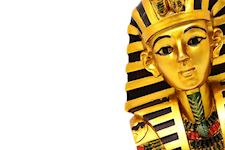Egyptology Online Diploma
Egyptology Diploma
Elearn College
Summary
- Certificate of completion - Free
Add to basket or enquire
Overview
Egyptology is an academic discipline that specializes in the study of ancient Egypt. It focuses on the archaeology, language, literature, history, religion, and art of that culture, but in recent decades the geographical scope of the field has been expanded to include research into Nubia (modern northern Sudan), which maintained close links with Egypt and had cultural affinities with it for several millennia.You will gain an in-depth understanding of Ancient Egypt’s archaeology, art, religion, history, and society through the acquisition of key interpretive skills.
Certificates
Certificate of completion
Digital certificate - Included
Course media
Description
Egyptology is not a single discipline, but a branch of 'Area Studies'. Egyptologists study all the aspects of ancient Egypt that they can, across periods from about 7,000 BC to the early middle ages. They work from many perspectives, using approaches and methods ranging all the way from literary theory in the humanities to hard sciences in the physics of radiocarbon dating. They are active as academics, researchers and museum curators, and they communicate their work as widely as they can. No two Egyptologists have the same interests and focuses.Knowledge of ancient Egyptian language and texts was lost from around 400 AD until the decipherment of the hieroglyphic script, which was announced by Jean-François Champollion at a meeting of the Académie des Inscriptions in Paris on 27 September 1822. The interruption in tradition between antiquity and today brings Egyptology closest to archaeology as a field of enquiry, but the vast bodies of Egyptian texts that have been found must be studied with other methods. Archaeology, research on texts and study both of monuments in Egypt and of collections around the world constantly open up new possibilities of understanding. In the late fourth millennium BC, the contemporaneous civilisations of Egypt and Mesopotamia were the world’s first state-level societies. Throughout most of the next three millennia Egypt was a single polity, whereas Mesopotamia was generally a group of city-states. Similarities and differences between the two areas bring out distinctive features of each. Egyptian architecture and visual forms are uniquely rich, while Mesopotamian texts on clay tablets offer unmatchable materials for studying economy, institutions and ancient intellectual life. Comparative study, not just of these two regions but of early civilisations across the world, has blossomed in recent years and offers great promise for the future. Ancient Egyptian society, like that of most early civilisations, was extremely unequal. Whether we like it or not, inequality stimulated creativity. Because their subject is a complete society, Egyptologists are able to bring together areas of study that tend to be treated apart in many fields. One example is the relationship between image and word. From the period of state formation onward, the high-cultural images created for and by elites are dazzling in their richness and complexity. Elite groups developed styles of monuments and of commemoration that we struggle to understand. Their achievements included the invention and elaboration of one of the earliest writing systems. That system’s display form of hieroglyphs was integrated more perfectly with pictorial images than almost any other, in compositions that range from the self-explanatory to the very cryptic. Egyptian mixed images provide inspiration to the authors of comic strips, some of whom have written with great insight about Egyptian forms. course guides you through the Ancient Egyptian’s understanding of each of these areas and even covers the more controversial theories that they had advanced ‘spiritual technology’ and that they were assisted by ‘ancient aliens’. An issue that can be contentious, the Egyptology Diploma Course discusses how historians have viewed race in Ancient Egypt, how Ancient Egyptians viewed it themselves, how we look at it today, and the views of the prominent historians, Cheikh Anta Diop.
Who is this course for?
This course is suitable for anyone having an interest in Egyptology and fans of history will also love this course. Covering a great breadth of this ancient civilization’s way of life and contributions to human history, this course is a great start to your studies of Ancient Egypt.
Requirements
There are no entry requirements. No background training or qualifications are required. Anyone can enroll at any time, beginners, intermediates and experienced all year round.
Career path
The study of Egyptology crosses many disciplinary boundaries, including art history, social history, anthropology, economics, religious studies, philology, and (increasingly) technology. There are a number of more stable, more lucrative career paths that might allow you to engage in the study of Egyptology without making it your main career choice.
Questions and answers
Currently there are no Q&As for this course. Be the first to ask a question.
Reviews
Legal information
This course is advertised on reed.co.uk by the Course Provider, whose terms and conditions apply. Purchases are made directly from the Course Provider, and as such, content and materials are supplied by the Course Provider directly. Reed is acting as agent and not reseller in relation to this course. Reed's only responsibility is to facilitate your payment for the course. It is your responsibility to review and agree to the Course Provider's terms and conditions and satisfy yourself as to the suitability of the course you intend to purchase. Reed will not have any responsibility for the content of the course and/or associated materials.


